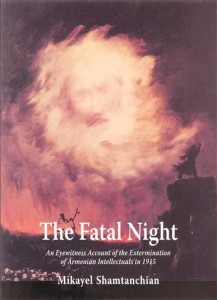Ruzan Orkusyan
Staff Writer
 The Fatal Night: An Eyewitness Account of the Extermination of Armenia Intellectuals in 1915. Studio City, CA: H. and K. Manjikian Publishers, 2007. 67pp. Volume 2 of the Armenia Genocide Library Book Series.
The Fatal Night: An Eyewitness Account of the Extermination of Armenia Intellectuals in 1915. Studio City, CA: H. and K. Manjikian Publishers, 2007. 67pp. Volume 2 of the Armenia Genocide Library Book Series.
Mikayel Shamtanchian vividly captures the events of April 1915 and the succeeding years with a poignant, tragic, and at times even a sarcastic and bitter tone. With grace and sophistication he delves into the tumultuous psychology of the prisoners, guards, and Turkish government during the period of the Armenian Genocide. Through his writing style he transports readers to the roads leading to exile and persecution that he and countless other Armenians experienced. Ishkhan Jinbashian brings to life Shamtanchian’s experiences in this breathtaking translation, as part of the H. and K. Manjikian Armenian Genocide Library Book Series.
Shamtanchian was a prominent Armenian intellectual, an orator, editor, translator, and teacher. He was arrested along with hundreds of Armenian intellectuals on the eve of April 24, 1915 and deported to Anatolia. His memoir offers a day-by-day, week-by-week account of the journey from Istanbul, his home, to a place of exile and murder. According to the back jacket, the book is a “profoundly-nuanced psychological portrait of innocent men who experienced the indignities and uncertainty of exile before being massacred.” Shamtanchian movingly describes the confusion and naivety of the exiled, the undying hope hanging by a few tattered threads, while sprinkling the text with the bitter taste of disillusionment.
The most touching moments are the stoic portraits of fellow intellectuals like Siamanto, Ruben Zardarian, Varuzhan and Sevak, whom we see marching to their tragic deaths. We see the unity of the Armenian people, their endless fight against all odds. We hear their everlasting hope and faith in the “wistful echoes” of Komitas’ “Lord, Have Mercy.”
Through Shamtanchian we witness the clash between “the constructive spirit of the Armenian nation, which knows how to breathe life into something sterile and transform evil into good,” and the Armenophobic Turks, whose hateful glances and stark disregard for human life destroy countless lives. And in the midst of carnage and calamity, Shamtanchian offers a silver lining, suggesting that those like himself who “witnessed death and survived came out tougher than ever.”
Shamtanchian’s memoir is a must read for Armenians and non-Armenians alike. It is a passionate philosophical journey to the depths of inferno and back, powerfully woven by a veteran hand. Offering a unique and heartbreaking glimpse into the hearts and minds of the intellectuals, The Fatal Night is a “literary masterpiece of haunting lyricism” that reminds readers of the tragic acts of the Armenian Genocide and the inner fortitude with which the Armenians rebuilt their lives.
 Hye Sharzhoom Armenian Action
Hye Sharzhoom Armenian Action